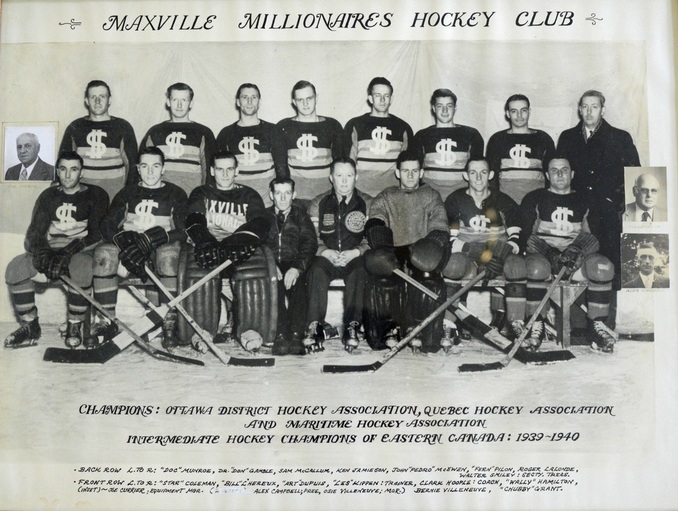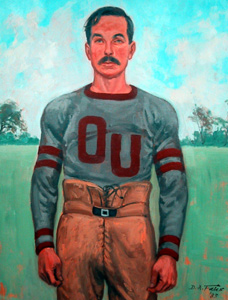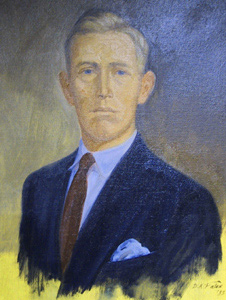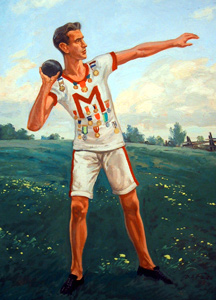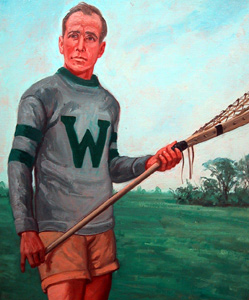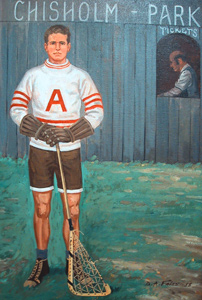1983
Maxville Millionaires | Joe Corbett | Alexander Grant | Gus MacIntosh | Tupper McDonald | Paul Pilon
1939-40 Maxville Millionaires Hockey Club
The Maxville Millionaires, coached by Osie Villeneuve and Clark Hoople, were
assembled in 1931-32 and played their first few games in the new Jubilee Arena.
With tattered sweaters and sparse equipment, the Millionaires gradually earned
the famed nickname “from rags to riches”. They won the Citizen Shield,
emblematic of Ottawa District Intermediate Hockey supremacy in 1936, 1938,1939,
and 1940. In April 1940, the Millionaires defeated the Maritime winners who had
already eliminated Quebec, in Glace Bay, Nova
Scotia. They were then crowned Intermediate Hockey
Champions of Eastern Canada.
|
Joseph "Joe" Corbett
Joseph Corbett was born April 19th, 1873, in Alexandria. He was a son of John Corbett and his wife, the former Janet MacDonald. Again, like a lot of boys from school days, and throughout his life, this great athlete and railway train dispatcher was known as Joe Corbett. (He was a nephew of Rt. Rev. Msgr. George Corbett) Joe Corbett began his railway and athletic career at the age of 16. This was the era of lengthy, wide-open lacrosse fields for 12-man teams using the long handled sticks. |
|
Joe Corbett’s fleetness afoot contributed to his greatness on the lacrosse sward and track and field competitions. He garnered many silver and gold medals in Vankleek Hill, Alexandria, Williamstown, and Cornwall meets before he was transferred to Ottawa to become a train dispatcher. In Ottawa, he continued his athletic career and won more awards in Canadian competitions. Joe Corbett failed to be selected to Canada’s Olympic team at the turn of the century by just two points.
His forte was football playing with Ottawa College, now Ottawa U., in the Quebec Union. On Thanksgiving Day, November 28, In Montreal, 1901, Joe celebrated his greatest day in the realm of sport. He was singled out as one of the chief reasons Ottawa College defeated the Toronto Argos, thus winning what is today’s Grey Cup. Joe Corbett died June 26, 1944. |
Alexander Grant
Alexander Angus Grant was born in Dunvegan, August 17, 1897. He was the
eldest son of Angus Grant and his wife, the former Katie MacDonald. Like most
boys with a lengthy given name, when he attended school in Dunvegan his name
was shortened to “Alex”.
Alex Grant, in his youth, was an ardent soccer and rifle target shooting fan. As a result he became not only one of Dunvegan’s leading soccer players but he also founded the organization of football (soccer) in Glengarry in 1924. In target shooting, Alex Grant travelled all the way from county “Gravel Pit” turkey shoots to the Connaught Rifle Ranges, Ottawa, where he won many valuable awards. Alex Grant died April 11, 1967. |
|
A
|
Dr. Gustavus "Gus" MacIntosh
Dr. Gustavus McIntosh was born on his parental farm home in the “Gore” of Lochiel Township, July 18, 1874. His parents
were Donald McIntosh and his wife, the former Margaret Munro. He was known as
“Gus” from childhood.
After graduating from Dalkeith public school and Vankleek Hill Collegiate he attended the Ottawa Normal obtaining a teacher’s degree. “Gus” McIntosh spent a few years teaching in Glengarry schools. During this time he became one of the luminaries in field days that included Cornwall, Ottawa, and Montreal. He was a protege of “Big Rory” MacLennan, and among the leaders in the hammer throw. |
|
“Gus” McIntosh then enrolled in the McGill Faculty of Medicine. At McGill he really demonstrated his prowess with the college track and field team, competing in Canadian Intercollegiate meets. Long after graduation, a plaque commemorating the athletic achievements of Dalkeith’s “Gus” McIntosh was prominent in the Student Union Building.
Dr. Gustavus McIntosh practised medicine in Devil’s Lake, North Dakota. He died at the age of 80, in 1954. |
Dr. Alexander Tupper McDonald
Dr. Alexander Tupper McDonald was born in Williamstown, October 2nd, 1875.
He was the second son of John Alexander McDonald and his wife the former Mary
Alexander. From his youth he was known as “Tupper” McDonald.
In his early school and local sport career, “Tupper” McDonald demonstrated a potential of greatness. He attained this class in track, field, hockey and lacrosse. It was with Queen’s University champion football teams at the turn of the century that “Tupper” scaled the heights of stardom. |
|
After graduating in Medicine he declined the usual practice to assist his parents in the operation of their mercantile business, insurance and post office. He died November 1, 1963.
|
Paul Pilon
Paul Pilon was born in Montreal,
June 6, 1915. He was the son of “J.T.” Pilon and his wife, the former Blanche
Rochon. Paul Pilon became a Glengarrian by adoption when his family took up
residence in Alexandria
in 1918.
Paul Pilon was involved in sports from his elementary school days. As an Alexandria High School student, his prowess was noted beyond his home playgrounds, especially in inter high school field days and United Counties’ competitions in Cornwall. His awards were many and cherished by his family. In Chisholm Park and Eastern Ontario box lacrosse,Paul was a two-way stalwart playing with and against able bodied men although he was only a teenager. The same can be said of his hockey talent. When not playing such games, he found time to play tennis and even croquet with his elders on the Alexandria court. |
|
The Pilon family moved to Ottawa in 1934. Paul was soon rated among the high school budding stars in football and Ottawa Junior City League hockey.
As a two-way, scoring defenceman, hockey became his best game, so much so that Clarkson College, Potsdam, N.Y., gave him a scholarship in Chemical Engineering. The Montreal Canadiens, by this time (1938), were anxious to sign Paul to a contract. On his way back to Potsdam from Cornwall, where he had conferred with Canadian officials, Paul Pilon was killed in a tragic car accident. This promising young NHL prospect was considered the greatest French Canadian athlete in the annals of Glengarry sport history. |

